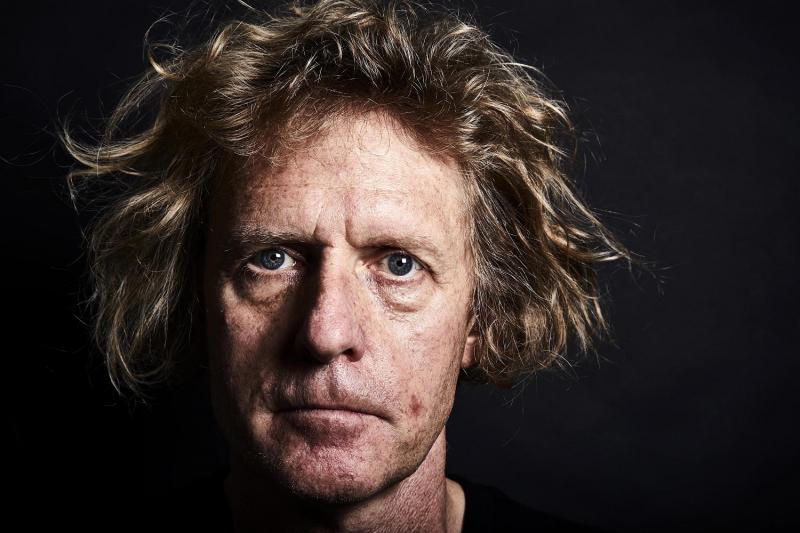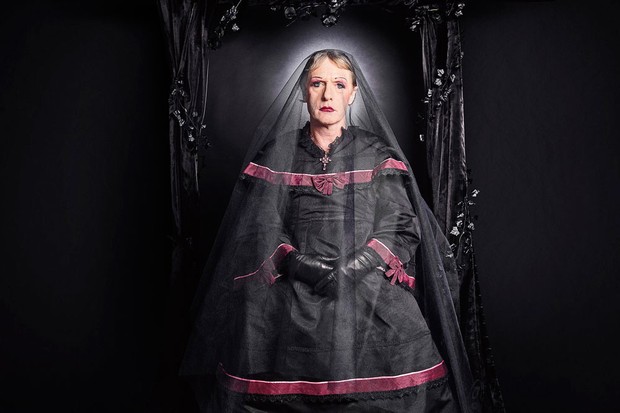Grayson Perry: Rites of Passage, Channnel 4 review - making meaning in death | reviews, news & interviews
Grayson Perry: Rites of Passage, Channnel 4 review - making meaning in death
Grayson Perry: Rites of Passage, Channnel 4 review - making meaning in death
Home and away: the artist observes rituals in Sulawesi, then creates them in Hounslow

Grayson Perry is at it again. The Turner Prize winner, Reith lecturer, sculptor, printmaker, ceramicist, curator, writer, British Museum trustee, CBE, RA – plus Britain's and the art world’s favourite transvestite – is trying to find sense in things and events, or, as he has put it, invent meaning in a meaningless world.
Channel 4 is devoting four hours to Perry’s investigations of rituals and ceremonies for our secular world, as well as those discovered from worlds rather less secular. We started with death at what might usually be taken as the end, after birth, coming of age and marriage. The premise is that, as we live in an increasingly secular society, we no longer have agreed rituals, and yet ceremonies and shared symbolic events are important to mark the milestones of our passage through whatever life we lead.
Since all rituals were invented by somebody, what can we learn from others? Grayson went travelling to discover, and then found people back in the UK to help invent their own ceremonies. In this opening episode about death, he was always informally and casually dressed, never appearing in all the glitter, make-up and fabulous costumes of his alter ego, Claire. They might have cheered things up a bit. (Pictured below, Grayson Perry assays mourning mode)
We are making meaning, Perry said, from the patterns of being alive
He started out on the Indonesian island of Sulawesi, invited to a village of the Toruja tribe for the funeral of an elder, Mr Allow; he met the 86-year-old widow, who much enjoyed pulling the presenter’s long nose. The couple had been married for 70 years, and Mr Allow had been dead for over a year, kept embalmed in a decorated coffin in the family home, his wife sleeping in the neighbouring room. A funeral only happens when the family feels ready, and they typically wait a year or so. Twenty-four buffaloes were sacrificed as tribute at this one, reflecting the status of the deceased.
In a nearby village, Mrs Joshua had died and a daughter was wailing in grief, draped over her mother’s coffin. The coffin was filled mainly with the dead woman's clothes, and we had only a glimpse of her bespectacled face. In Toraja culture the body remains with the family and is never left alone. Members of the family hold continual one-way conversations, but seemed here to feel a response. The embalmed body is a member of the family living, so to speak, in the house until the funeral.  For his first British encounter, Perry travelled to Hounslow; Roch Maher (1961-2018) had been diagnosed with motor neurone disease and given 18 months to live, but that was eight years ago. Now confined to a wheelchair, he breathed through a ventilator, and felt the end was nigh: the plan was to devise a kind of living funeral for Roch.
For his first British encounter, Perry travelled to Hounslow; Roch Maher (1961-2018) had been diagnosed with motor neurone disease and given 18 months to live, but that was eight years ago. Now confined to a wheelchair, he breathed through a ventilator, and felt the end was nigh: the plan was to devise a kind of living funeral for Roch.
Jordan Seddon (2000-2017) had been knocked over on his bicycle by a drunken driver, and Perry travelled to meet the Seddon family on the outskirts of Middlesbrough. His bedroom had been kept as it was, his mother Alison finding it unbearable to have lost a child. There was a wall of memorabilia with photographs and mementoes, mottos and loved objects, a kind of shrine expressing their mourning, .
The film cut back and forth between a life consciously drawing to an end from neurological disease, and a life cut desperately short by accident. Maher decided he wanted a ceremony at which he could be present, alongside his wife, adult children and a wide circle of friends.
For Jordan, Perry made a kind of icon, and father Kevin and Alison decided to make a pilgrimage around the fields of the Nethersfield estate on the day their son would have turned 18. The procession carried pilgrim staffs, photographs, Perry’s icon, and flowers. They walked from the estate to the cemetery and Jordan’s grave. And then red and blue balloons, marked 18, were let loose into the air. We are making meaning, Perry said, from the patterns of being alive, framing the big moments.
Back in London, he made a decorated urn, reminiscent perhaps of a funerary receptacle, for Maher’s living funeral at a local church. It is a memory jar, which will hold objects associated with his life: football season tickets, bottles of drink and photographs all went in, from different hands, each with an explanation, a word or two. Roch’s wife Deirdre read a loving poem; images of their lives were projected onto a background screen; the blue garter from their wedding went into the memory jar. Roch put aside his oxygen tube to speak, appropriately the last. It was indeed an affecting celebration of life. He was lucky, he said, to have known before he died how much he had been loved and liked. If you know how to live, you know how to die.
Rites of Passage felt uncomfortably voyeuristic and, for all its apparent empathy, curiously empty. A kind of contemporary anthropology, it signified nothing. If Grayson Perry and the paraphernalia of television brought comfort to the British families he visited, that is a fine thing; but a television programme it did not make. And if ever there was a time when advertisements felt jarring and intrusive, this was it.
rating
Share this article
The future of Arts Journalism
You can stop theartsdesk.com closing!
We urgently need financing to survive. Our fundraising drive has thus far raised £49,000 but we need to reach £100,000 or we will be forced to close. Please contribute here: https://gofund.me/c3f6033d
And if you can forward this information to anyone who might assist, we’d be grateful.

Subscribe to theartsdesk.com
Thank you for continuing to read our work on theartsdesk.com. For unlimited access to every article in its entirety, including our archive of more than 15,000 pieces, we're asking for £5 per month or £40 per year. We feel it's a very good deal, and hope you do too.
To take a subscription now simply click here.
And if you're looking for that extra gift for a friend or family member, why not treat them to a theartsdesk.com gift subscription?
more TV
 Blu-ray: The Sweeney - Series One
Influential and entertaining 1970s police drama, handsomely restored
Blu-ray: The Sweeney - Series One
Influential and entertaining 1970s police drama, handsomely restored
 I Fought the Law, ITVX review - how an 800-year-old law was challenged and changed
Sheridan Smith's raw performance dominates ITV's new docudrama about injustice
I Fought the Law, ITVX review - how an 800-year-old law was challenged and changed
Sheridan Smith's raw performance dominates ITV's new docudrama about injustice
 The Paper, Sky Max review - a spinoff of the US Office worth waiting 20 years for
Perfectly judged recycling of the original's key elements, with a star turn at its heart
The Paper, Sky Max review - a spinoff of the US Office worth waiting 20 years for
Perfectly judged recycling of the original's key elements, with a star turn at its heart
 The Guest, BBC One review - be careful what you wish for
A terrific Eve Myles stars in addictive Welsh mystery
The Guest, BBC One review - be careful what you wish for
A terrific Eve Myles stars in addictive Welsh mystery
 theartsdesk Q&A: Suranne Jones on 'Hostage', power pants and politics
The star and producer talks about taking on the role of Prime Minister, wearing high heels and living in the public eye
theartsdesk Q&A: Suranne Jones on 'Hostage', power pants and politics
The star and producer talks about taking on the role of Prime Minister, wearing high heels and living in the public eye
 King & Conqueror, BBC One review - not many kicks in 1066
Turgid medieval drama leaves viewers in the dark
King & Conqueror, BBC One review - not many kicks in 1066
Turgid medieval drama leaves viewers in the dark
 Hostage, Netflix review - entente not-too-cordiale
Suranne Jones and Julie Delpy cross swords in confused political drama
Hostage, Netflix review - entente not-too-cordiale
Suranne Jones and Julie Delpy cross swords in confused political drama
 In Flight, Channel 4 review - drugs, thugs and Bulgarian gangsters
Katherine Kelly's flight attendant is battling a sea of troubles
In Flight, Channel 4 review - drugs, thugs and Bulgarian gangsters
Katherine Kelly's flight attendant is battling a sea of troubles
 Alien: Earth, Disney+ review - was this interstellar journey really necessary?
Noah Hawley's lavish sci-fi series brings Ridley Scott's monster back home
Alien: Earth, Disney+ review - was this interstellar journey really necessary?
Noah Hawley's lavish sci-fi series brings Ridley Scott's monster back home
 The Count of Monte Cristo, U&Drama review - silly telly for the silly season
Umpteenth incarnation of the Alexandre Dumas novel is no better than it should be
The Count of Monte Cristo, U&Drama review - silly telly for the silly season
Umpteenth incarnation of the Alexandre Dumas novel is no better than it should be
 The Narrow Road to the Deep North, BBC One review - love, death and hell on the Burma railway
Richard Flanagan's prize-winning novel becomes a gruelling TV series
The Narrow Road to the Deep North, BBC One review - love, death and hell on the Burma railway
Richard Flanagan's prize-winning novel becomes a gruelling TV series
 The Waterfront, Netflix review - fish, drugs and rock'n'roll
Kevin Williamson's Carolinas crime saga makes addictive viewing
The Waterfront, Netflix review - fish, drugs and rock'n'roll
Kevin Williamson's Carolinas crime saga makes addictive viewing

Add comment